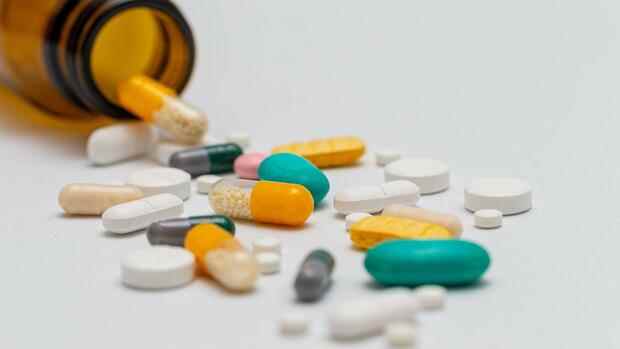The pharmaceutical industry draws a positive balance of innovation for 2021: 46 drugs with new active ingredients were brought onto the market in Germany.
(Photo: imago images / MiS)
Frankfurt Despite the pandemic, the pharmaceutical companies have brought more new drugs onto the market this year than they have in years: a total of 46 products with new active ingredients were launched in Germany. This is shown by the current statistics of the Association of Research-Based Pharmaceutical Companies (vfa).
Four of them were developed for the prevention and treatment of Covid-19. On the one hand, there are the Covid-19 vaccines from the companies Moderna, Astra-Zeneca and Johnson & Johnson, which were approved at the beginning of the year, and which followed the mRNA vaccine from Biontech, which was approved in December 2020.
In addition, the infusion solution Ronapreve, which was developed jointly by the Swiss Roche Group and the US company Regeneron, came onto the market for the treatment of a corona infection. The genetically engineered active ingredient consists of antibodies that bind to Sars-CoV-2 and thus prevent the virus from multiplying.
A few days ago, two more Covid-19 preparations were approved, which will soon also be supplied to Germany: the protein-based Covid-19 vaccine from the US biotech company Novavax and the antibody drug from Glaxo-Smithkline and the biotech company Vir.
Top jobs of the day
Find the best jobs now and
be notified by email.
Vfa President Han Steutel sees the year 2021 as extraordinary: “Never before has therapeutic drugs been developed, tested, officially tested and, after approval, brought into the supply,” he said. The total number of 46 new product launches is also exceptional. This value has only been exceeded once since the turn of the millennium: 49 new drugs were introduced in 2014.
The number of new drugs is increasing
Overall, the innovation balance of the pharmaceutical industry has improved significantly in the past 20 years: While in the first decade after the turn of the millennium, an average of 28 new drugs were brought onto the market in Germany per year, between 2011 and 2020 there were around 32. This reflects the technological advances in research and development, but also the increasing focus of the industry on rare diseases, for which approval applications can be submitted more quickly.
In 2021, eleven of the newly launched drugs with new active ingredients had what is known as orphan drug status in the EU. This shows that the EU Medicines Agency Ema classifies them as superior to previous treatment options for the respective rare diseases – if there is already a treatment. The EU rates diseases that affect no more than five out of 10,000 EU citizens as rare.
Most of the new drugs launched this year are directed against cancer: there are 14 in total. The focus on oncology has been evident in the industry for years.
In addition to common types of cancer such as breast cancer or non-small cell lung cancer, rare types of cancer such as certain lymphomas (lymph gland cancer) are also addressed. For five of these drugs, a gene or tissue test is used to check whether the cancer cells have a certain mutation against which the drug is targeting. This approach is known as personalized medicine.
In addition, in twelve cases, according to studies, companies were able to expand the area of application of a drug that had been in use for a long time to other types of cancer and thus help even more people affected.
New reserve antibiotics against multi-resistant pathogens
In addition to the 14 drugs against cancer, a total of nine new drugs against infectious diseases were launched, followed by five drugs against cardiovascular diseases.
Among other things, two new antibiotics came onto the market in Germany. The products of the companies Shionogi and MSD are reserve antibiotics that contribute to the growing problem of multi-resistant pathogens. Reserve antibiotics are only used for infections with bacteria that are resistant to the common antibiotics or if an effect must be ensured in the case of very severe infections.
Listed by company, the Swiss Roche group was the most successful with a total of four new launches, followed by the US group Johnson & Johnson with its pharmaceutical division Janssen and Astra-Zeneca with three market launches each. Only one new active ingredient came from Germany: Bayer launched the drug Vericiguat for chronic heart failure.
More: These are the bearers of hope among corona drugs – and this is how they work

